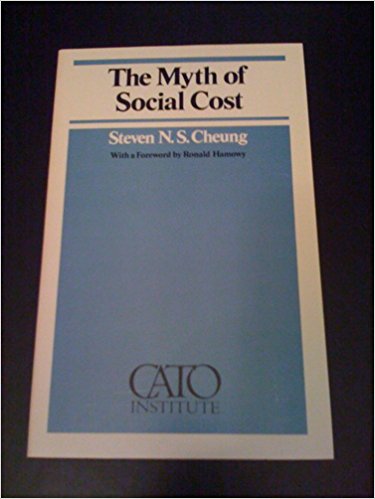

 |

|

The average rating for The myth of social cost based on 2 reviews is 3 stars.
Review # 1 was written on 2013-01-05 00:00:00 Neveu Jean-pierre Neveu Jean-pierreI am giving this an average rating for two reasons: First, you have to be very well-versed on different social cost theories. I know what externalities are, and I am pretty good in economics, however, Professor Cheung goes very in-depth about different theories. He goes on to show why Pigou was wrong by using Pigou's own resources and citations. However, at the same time, it gets a bit complicated.. so much that I don't really get where he was going with it. So, is it fair for me to review or rate? Well, that leads me to my next reason.. 2. The heavy use of graphs pertaining to the first half of the book. I don't mind graphs, and I can read them fine. However, these graphs were one giant page (sideways) long and he'd go on to talk about different sections of it for some length, and having to flip back, turn the book around, and all of that is just a hassle. Perhaps he should have just tried to explain it better through words. Anyway, I don't recommend for anyone who isn't already well-versed in externality economics. |
Review # 2 was written on 2013-12-31 00:00:00 Johnie Cash Johnie CashInteresting Quotes: "[A]mong the 'circumstances' which Pigou chose not to specify is the nature of property rights governing the use of the roads; but property rights are indispensable constraints for any decision involving more than one individual. Moreover, Knight was essentially correct in pointing out that if private ownership is established, "'the owner ofthe narrow road can charge for its use a toll representing its 'superiority' over the free road, [and] in accordance with the theory of rent, . . . the toll will exactly equal the ideal tax . . .' In charging the market with failure to attain the maximum social benefit while disallowing private property rights (upon which all private transactions must be based), Pigou was indeed barking up the wrong tree. To my knowledge Pigou never replied to Knight's paper, although the example of the two roads was deleted from later editions of The Economics of Welfare: the debate was over when it had barely begun. This, together with the difficult nature of Knight's paper, may explain the slow progress of social-cost analysis in spite of numerous writings on the subject. It was not until the publication of Coase's paper 36 years later that the issue at stake was again brought into academic debate." -Steven N.S. Cheung, The Myth of Social Cost -------------------------------------------------- "[A]ny government action can be speciously justified on efficiency grounds by the simple expedient of assuming that transaction costs in the market are high and that costs of governmental control are low. The use of such arbitrary (often implicit) assumptions, a routine practice in the traditional analysis of social cost, is appropriate neither for economic explanation nor for policy formulation." -Steven Cheung, the Myth of Social Cost ---------------------------------------------------- "The serious problems of the environment and conservation exist where there is common, and not private, ownership. In Africa, for example, lions have been treated in the past as common property''fair game' for anyone'with the result that their numbers have fallen drastically during the 20th century. But in the UK lions are reared and held under private ownership (in game parks and zoos), and the British lion population has boomed. Indeed, British game parks are now exporting their surplus lions'to Africa! This is 'taking coals to Newcastle' with a new twist." -John Burton, Externalities, Property Rights, and Public Policy : Private Property Rights or the Spoliation of Nature, epilogue of the Myth of Social Cost ------------------------------------------------------ "Cultivated farmland was far more extensive during the Roman era than before or after, and huge areas that have become desert were then green and plenteous. Tripolitania and Cyrenaica (the eastern Roman province) may not have been the granaries of the Roman empire, but the desert was then held far more extensively in check than under the following eras of Vandal, Berber and Arab rule. "Historical research suggests that there was no wide variation in climatic conditions to account for the rolling back of the desert in the Roman era and the long-term trend to desertification thereafter. The answer seems to lie in the errors of human beings, not in the accidents of nature. Systems of common land ownership now account for the bulk of Libyan acreage, and have done so for over fifteen hundred years, since the Vandals expelled the Romans from Libya, circa AD 455. But under Roman rule the land was extensively farmed under a system of private property rights. During the early empire it was farmed primarily by Berber peasants and other smallholders such as retired soldiers who had been granted private property rights in plots of land. Later there also emerged latifundia (large privately-owned estates) worked by Berber serf labour. With land held privately, there was incentive to conserve vegetation, rather than to treat it as a 'free good'). The benefits and costs of planting and grazing impinged upon the owner and not others: the externalities were 'internalised'" "Following the decline of Roman rule, the system of private property rights in land reverted to that of tribal ownership . . . The long-term consequences of that change in the system of property rights are written in the encroaching sands of the Libyan desert today. -John Burton, Externalities, Property Rights, and Public Policy : Private Property Rights or the Spoliation of Nature, epilogue of the Myth of Social Cost --------------------------------------------------------------- |
CAN'T FIND WHAT YOU'RE LOOKING FOR? CLICK HERE!!!